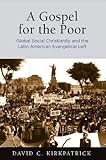A Gospel for the Poor : Global Social Christianity and the Latin American Evangelical Left / David C. Kirkpatrick.
Material type: TextPublisher: Philadelphia : University of Pennsylvania Press, [2019]Copyright date: ©2019Description: 1 online resource (288 p.) : 10 illusContent type:
TextPublisher: Philadelphia : University of Pennsylvania Press, [2019]Copyright date: ©2019Description: 1 online resource (288 p.) : 10 illusContent type: - 9780812296051
- 278/.082
- online - DeGruyter
| Item type | Current library | Call number | URL | Status | Notes | Barcode | |
|---|---|---|---|---|---|---|---|
 eBook
eBook
|
Biblioteca "Angelicum" Pont. Univ. S.Tommaso d'Aquino Nuvola online | online - DeGruyter (Browse shelf(Opens below)) | Online access | Not for loan (Accesso limitato) | Accesso per gli utenti autorizzati / Access for authorized users | (dgr)9780812296051 |
Frontmatter -- Contents -- List of Abbreviations -- Introduction. Toward a Gospel for the Poor -- Chapter 1. A New Style of Evangelicalism from Latin America -- Chapter 2. Revolutionary Ferment -- Chapter 3. Cold War Christianity -- Chapter 4. Deporting American Evangelicalism -- Chapter 5. Marketing Social Christianity -- Chapter 6. Crossing Boundaries -- Chapter 7. The Reshaping of Global Evangelicalism -- Conclusion. A Global Reach -- Notes -- Bibliography -- Index -- Acknowledgments
restricted access online access with authorization star
http://purl.org/coar/access_right/c_16ec
In 1974, the International Congress on World Evangelization met in Lausanne, Switzerland. Gathering together nearly 2,500 Protestant evangelical leaders from more than 150 countries and 135 denominations, it rivaled Vatican II in terms of its influence. But as David C. Kirkpatrick argues in A Gospel for the Poor, the Lausanne Congress was most influential because, for the first time, theologians from the Global South gained a place at the table of the world's evangelical leadership—bringing their nascent brand of social Christianity with them.Leading up to this momentous occasion, after World War II, there emerged in various parts of the world an embryonic yet discernible progressive coalition of thinkers who were embedded in global evangelical organizations and educational institutions such as the InterVarsity Christian Fellowship, the International Fellowship of Evangelical Students, and the International Fellowship of Evangelical Mission Theologians. Within these groups, Latin Americans had an especially strong voice, for they had honed their theology as a religious minority, having defined it against two perceived ideological excesses: Marxist-inflected Catholic liberation theology and the conservative political loyalties of the U.S. Religious Right.In this context, transnational conversations provoked the rise of progressive evangelical politics, the explosion of Christian mission and relief organizations, and the infusion of social justice into the very mission of evangelicals around the world and across a broad spectrum of denominations. Drawing upon bilingual interviews and archives and personal papers from three continents, Kirkpatrick adopts a transnational perspective to tell the story of how a Cold War generation of progressive Latin Americans, including seminal figures such as Ecuadorian René Padilla and Peruvian Samuel Escobar, developed, named, and exported their version of social Christianity to an evolving coalition of global evangelicals.
Mode of access: Internet via World Wide Web.
In English.
Description based on online resource; title from PDF title page (publisher's Web site, viewed 21. Jun 2021)


